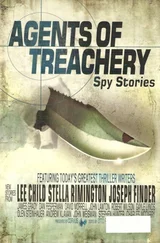David Ignatius - Agents of Innocence
Здесь есть возможность читать онлайн «David Ignatius - Agents of Innocence» весь текст электронной книги совершенно бесплатно (целиком полную версию без сокращений). В некоторых случаях можно слушать аудио, скачать через торрент в формате fb2 и присутствует краткое содержание. Жанр: Шпионский детектив, на английском языке. Описание произведения, (предисловие) а так же отзывы посетителей доступны на портале библиотеки ЛибКат.
- Название:Agents of Innocence
- Автор:
- Жанр:
- Год:неизвестен
- ISBN:нет данных
- Рейтинг книги:3 / 5. Голосов: 1
-
Избранное:Добавить в избранное
- Отзывы:
-
Ваша оценка:
- 60
- 1
- 2
- 3
- 4
- 5
Agents of Innocence: краткое содержание, описание и аннотация
Предлагаем к чтению аннотацию, описание, краткое содержание или предисловие (зависит от того, что написал сам автор книги «Agents of Innocence»). Если вы не нашли необходимую информацию о книге — напишите в комментариях, мы постараемся отыскать её.
Agents of Innocence — читать онлайн бесплатно полную книгу (весь текст) целиком
Ниже представлен текст книги, разбитый по страницам. Система сохранения места последней прочитанной страницы, позволяет с удобством читать онлайн бесплатно книгу «Agents of Innocence», без необходимости каждый раз заново искать на чём Вы остановились. Поставьте закладку, и сможете в любой момент перейти на страницу, на которой закончили чтение.
Интервал:
Закладка:
“From ‘The Typewriter,’ ” said Rogers.
“Yes. Precisely. Everyone knows what that means. It means the story comes from me, from army intelligence, from the secret police. And that will be that. The story will run, praising one politician who is acting in the interest of the nation, condemning another one who is not.”
Rogers nodded. He wasn’t sure where Jezzine’s recitation was leading.
“Sometimes,” continued the general, “The Typewriter will supply the newspapers with information that originated, not with us, but with the American Embassy. Le Dactylo types it out, just the same, and it appears in the Beirut papers. And from here, it can be sent by news services around the world.”
“An efficient system,” said Rogers.
“Indeed it is. And one that is possible, I would immodestly add, only because of the efficiency and skill of the Lebanese intelligence service.”
“And the pliancy of Lebanese editors,” said Rogers.
General Jezzine’s mouth smiled. The rest of his face remained frozen. “That also reflects the efficiency of the Deuxieme Bureau,” he said.
“How?”
“Because Le Dactylo understands its clientele. We know that all Lebanese have a common weakness. To put it bluntly, they can be bought. It is a fact of life. We are a small, poor country with few resources. Our people live by their wits. They sell their most valuable asset, which is their loyalty, to the highest bidder. It is not our most admirable trait, perhaps, but it is understandable.
“Unfortunately we in the Deuxiene Bureau cannot afford to buy the loyalty of all our citizens. But we have learned a little secret: You do not have to bribe someone yourself, so long as you know the identity of the person who is bribing him. Do you understand what I am saying? Knowledge truly is power. This is our technique, and in this way we can control nearly everyone.”
“I’m not sure I understand,” said Rogers untruthfully. In fact, he understood the bureau’s methods perfectly well. It rigged elections, manipulated newspapers, and tapped telephones. It ran Lebanon.
“I will give you an example,” said Jezzine. “Several years ago, the president of the republic held a meeting with the editors of all the major newspapers. He gathered them around the table and turned to them one by one, addressing them by the names of the Arab rulers who sent them money.
“ ‘How is President Nasser?’ he said to the editor of the paper that received a secret bribe from the Egyptians. ‘How is President Assad?’ he said to the editor who received a stipend from Syria. ‘How is King Faisal?’ he said to the editor whose payoffs came from Riyadh. And then he came to the editor of our most respected and incorruptible newspaper.”
“And what did he say?” asked Rogers.
“He said, ‘How is the whole bloody world?’ ”
Rogers laughed at the joke. Jezzine smiled and squinted his eyes, which for him was the equivalent of a belly laugh.
“So you see,” continued Jezzine, “as long as we know who is paying whom in our corrupt little country, we have a handle on nearly everyone.”
“But not everyone?” queried Rogers.
“Alas, there are fanatics among us whose motives are not so clean. They hunger for something other than money. They want dignity, justice, things that are difficult to provide on this earth. They are a more difficult problem.”
“Forgive me for asking an impolite question,” interrupted Rogers. “But why are you telling me all this?”
“You are aware, no doubt, that we have a presidential election coming soon,” said the general.
“I am indeed aware of that,” said Rogers.
“In our view, this election will determine the future of Lebanon. It will be a contest between the bloc we call the ‘ Nahj ’-a term that refers to the ‘method’ of our president, which has guided this country successfully for twelve years-and the forces of corruption and anarchy that would succeed him. If we lose, the forces of anarchy will assume power-the corrupt bureaucrats and traders, the Moslem hooligans, the Palestinians. We stand for stability and order. Our opponents stand for change and disorder. It is appalling to imagine what might happen if they win.”
The general looked to Rogers for a nod of agreement or support but received none.
“Perhaps you do not understand,” said the general. “We in the Deuxieme Bureau have devised a formula for governing this riotous little country. We propose to run it like the army. The generals are Christians, yes, it is true. But many of the other officers are Sunni Moslems and Druse Moslems. And for soldiers, we have the Shiite Moslems, who ask only to be led. In an army, who thinks about religion? We are all Lebanese in the army, with one common purpose.”
The general again looked for a nod of encouragement from Rogers. But still there was none.
“Do you know what our president calls these little men of the opposition who propose to take the country away from us?”
“What?” asked Rogers.
“The fromagistes- the cheesemen. That is what you will have if they win the election. A nation run by the cheesemen.”
Rogers smiled. So it’s the cheesemen versus the rats, he told himself.
“What do you want from us?” asked Rogers.
The general sighed.
“Support. Encouragement. Money. I have already explained the details of what we need to Mr. Hoffman.”
“And what has he told you?” asked Rogers.
“That it is the policy of the United States to remain neutral in the election.”
“That is also my understanding of our policy.”
General Jezzine clucked his tongue in exasperation.
“You cannot expect me to believe that.”
“But it is true,” said Rogers. “We are neutral. We aren’t providing money to either side, I assure you.”
“Then I am offended,” said the general icily. “I am perturbed that you care so little about us.”
Rogers cocked his head.
“Wait a minute,” said the American. “Are you telling me that you are disappointed in America because we aren’t trying to fix your election?”
“Precisely,” said the general. He looked genuinely hurt.
Rogers wanted to laugh out loud but feared that he would offend his host even more.
“Do you know what your Mr. Hoffman told me when I raised these issues with him?” asked the general.
“No,” said Rogers, wondering what pearl of wisdom the station chief had offered.
“He said: ‘Take a walk, Charlie.’ Those were his precise words. Tell me, please, what does that mean?”
“It means no,” said Rogers. “It’s an emphatic way of saying no.”
There was an awkward silence.
“When you called me and suggested that you pay a visit,” continued the general, “I hoped that perhaps it was Mr. Hoffman’s way of apologizing and showing that he had changed his mind. But I gather that is not the case. You are not coming to offer support in the election?”
“No, I am not.”
“Pity,” said the general.
He stood and walked to his gun case, took out a shotgun, and pointed it toward the valley.
“I have come here for a different reason,” said Rogers.
“What is that?” responded the general diffidently from the window, aiming his gun at unseen targets.
“I will explain,” said Rogers. He rose from the couch and walked over to where the general was standing. He spoke carefully, in a confidential voice.
“Sir,” began Rogers. “The embassy is worried about the growth of underground militias among the Christians. We are worried that these organizations are part of a cycle of violence in Lebanon that may eventually become impossible to control. We assume that you know about these organizations.”
Читать дальшеИнтервал:
Закладка:
Похожие книги на «Agents of Innocence»
Представляем Вашему вниманию похожие книги на «Agents of Innocence» списком для выбора. Мы отобрали схожую по названию и смыслу литературу в надежде предоставить читателям больше вариантов отыскать новые, интересные, ещё непрочитанные произведения.
Обсуждение, отзывы о книге «Agents of Innocence» и просто собственные мнения читателей. Оставьте ваши комментарии, напишите, что Вы думаете о произведении, его смысле или главных героях. Укажите что конкретно понравилось, а что нет, и почему Вы так считаете.












